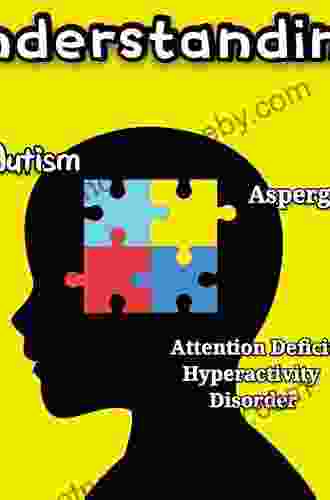Autism and Asperger syndrome are neurodevelopmental conditions that affect how an individual interacts with the world around them. They fall under the umbrella of autism spectrum disFree Downloads (ASDs),characterized by a range of challenges and strengths.
4.6 out of 5
| Language | : | English |
| File size | : | 2630 KB |
| Text-to-Speech | : | Enabled |
| Screen Reader | : | Supported |
| Enhanced typesetting | : | Enabled |
| Word Wise | : | Enabled |
| Print length | : | 160 pages |
| Lending | : | Enabled |
This article aims to provide a comprehensive overview of autism and Asperger syndrome, shedding light on their characteristics, causes, diagnosis, and management. By delving into the facts, we can foster a greater understanding and support for individuals with these conditions.
Characteristics of Autism and Asperger Syndrome
Autism and Asperger syndrome share several core characteristics, although they can manifest differently in each individual. These may include:
- Social difficulties: Individuals with autism or Asperger syndrome may have difficulty understanding social norms and cues, leading to challenges in building and maintaining relationships.
- Communication challenges: They may experience difficulties with verbal and nonverbal communication. For example, they may speak in a monotone or have difficulty understanding the emotional undertones in speech.
- Repetitive and restricted patterns of behavior: Individuals with ASDs may exhibit repetitive behaviors such as hand flapping or rocking, and have difficulty with changes in routine.
- Sensory sensitivities: They may be particularly sensitive to certain sensory stimuli, such as bright lights or loud noises.
It's important to note that not all individuals with autism or Asperger syndrome will experience all of these characteristics. The severity and presentation of symptoms can vary widely.
Causes of Autism and Asperger Syndrome
The exact causes of autism and Asperger syndrome are still not fully understood, but research suggests a combination of genetic and environmental factors may be involved.
Genetic factors: Studies have identified several genes that may increase the risk of developing ASDs. However, it's important to note that most individuals with these conditions do not have a clear genetic cause.
Environmental factors: Certain environmental factors, such as exposure to toxins or infections during pregnancy, may also play a role in the development of ASDs. However, more research is needed to determine the specific influences.
Diagnosis of Autism and Asperger Syndrome
Autism and Asperger syndrome are typically diagnosed based on a comprehensive evaluation by a healthcare professional, such as a developmental pediatrician or psychiatrist.
The diagnosis involves a detailed assessment of the individual's behavior, development, and medical history. The evaluation may include:
- Observation of the individual's behavior
- Interviews with the individual and their parents or caregivers
- Review of the individual's developmental milestones
- Medical and genetic examinations
Early diagnosis is crucial to ensure that individuals with autism or Asperger syndrome receive appropriate support and interventions.
Management of Autism and Asperger Syndrome
There is no cure for autism or Asperger syndrome, but a range of interventions can help manage the challenges and maximize strengths.
Early intervention: Early intervention services, such as speech therapy, occupational therapy, and social skills training, can provide essential support for young children with ASDs.
Education: Individuals with autism or Asperger syndrome may benefit from specialized educational programs that cater to their unique learning needs.
Social skills training: Social skills training can help individuals develop the skills necessary to navigate social situations successfully.
Behavioral therapy: Behavioral therapy can help address challenging behaviors and promote positive behaviors.
Medication: In some cases, medication may be used to manage specific symptoms, such as anxiety or attention deficit.
Supporting Individuals with Autism and Asperger Syndrome
Supporting individuals with autism or Asperger syndrome involves a multifaceted approach that includes:
- Education: Increasing awareness and understanding of ASDs in the community can reduce stigma and promote acceptance.
- Acceptance: Encouraging acceptance and celebrating the unique abilities of individuals with ASDs helps foster a sense of belonging.
- Support networks: Connecting individuals with ASDs and their families with support groups, online forums, and other resources can provide valuable assistance.
- Advocacy: Advocating for the rights and needs of individuals with ASDs ensures they have access to education, employment, and other essential services.
Autism and Asperger syndrome are complex neurodevelopmental conditions that affect individuals in diverse ways. By understanding the facts, we can create a more supportive and inclusive environment for those on the autism spectrum.
Early diagnosis and intervention, along with ongoing support, can empower individuals with autism or Asperger syndrome to reach their full potential and live fulfilling lives. As a society, we have a responsibility to embrace and celebrate the unique strengths and perspectives of individuals with ASDs.


























































































